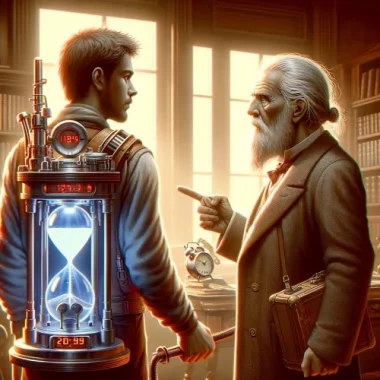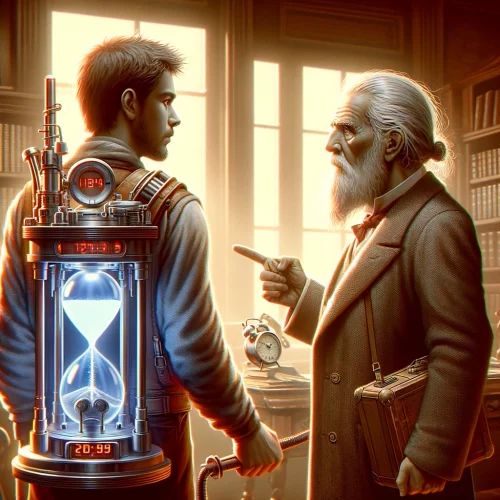
Grandfather Paradox
What is the Grandfather Paradox?
The Grandfather Paradox is like a brain teaser that comes up when you think about time travel. Imagine if you had a time machine, and you went back to the past, way before your parents were born, and did something to prevent your grandfather from ever meeting your grandmother. Now, if your grandfather never met your grandmother, your parent wouldn’t exist, and neither would you. But here’s the tricky part: if you were never born, how could you use a time machine to go back in time in the first place? This might sound like something right out of a movie, but it’s a serious question that has puzzled many smart people over the years.
The idea of the Grandfather Paradox doesn’t come from just one person. It’s something many science fiction authors, thinkers, and scientists have talked about when they imagine time travel. The name “Grandfather Paradox” comes from the classic story where someone goes back in time and stops their own grandfather from having kids. This kind of story sets off a chain reaction – if you stop your parent from being born, and then you can’t be born, there’s a big problem because you’re the one who caused it all by time traveling!
Key Arguments
- Time Travel Logic: The main discussion here is how time travel would work. Normally, things happen in order: first comes the cause, then the effect. But if you can travel back in time, could you change what has already happened?
- Causality Violation: The paradox brings up a case where the normal link between a cause and its effect is broken. Is it even possible to change the past in a way that could stop you from ever being born?
- Multiple Timelines: Some people think that when you go back in time, you might start a whole new history. In this new timeline, the changes you make don’t mess with your original history.
- Physical Impossibility: There’s also an idea that maybe the laws of the universe would stop you from creating this kind of paradox in the first place. Perhaps there are rules we don’t know about that prevent changes to the past that would cause such a problem.
Examples
- If you went back in time and accidentally prevented the invention of the time machine itself, then you can’t have used a time machine to go back – that’s the Grandfather Paradox.
- Suppose someone travels back and causes their younger self to make a different career choice, leading to a completely different life path. This shows the paradox because the person who went back wouldn’t exist in the way they do now.
- Consider a botanist who goes back in time to study ancient plants and steps on a rare flower, causing it to go extinct. If that flower was critical to human evolution, the botanist would’ve prevented their own existence, another example of the paradox.
- If a doctor traveled back and introduced modern medicine early, it could prevent the birth of the person who would eventually invent the time machine, resulting in the paradox.
- Imagine going back to the past and teaching your great-great-grandfather how to make a fortune. If he becomes rich and your family’s history changes completely, the time traveler might not be born into the same conditions, creating a paradoxical situation.
Answer or Resolution (if any)
Although the Grandfather Paradox is a real head-scratcher, people have come up with different ideas to solve or get around it:
- Novikov Self-Consistency Principle: This principle, named after Russian physicist Igor Dmitrievich Novikov, says that anything a time traveler does was always meant to happen. So you couldn’t change the past in a way that creates a problem because history would match up with whatever the time traveler does.
- Parallel Universes: There’s an idea called the “many worlds” theory that suggests if you change something in the past, you make a whole new universe. This means the time traveler’s actions have different results but do not change where they originally came from.
- Temporal Protection Hypothesis: Some thinkers believe there might be laws of nature we don’t know about that keep time from getting mixed up. These would stop anyone from making changes that cause a paradox to happen.
- Quantum Mechanics: There are some ideas from a part of science called quantum mechanics that suggest time travel might work without causing these confusing situations because of the way tiny particles behave.
Major Criticism
The Grandfather Paradox has been criticized for different reasons, especially because it’s all just thinking and guessing based on what we know about the world now:
- Lack of Real-World Examples: Some people say that because we’ve never actually seen time travel happening, this whole paradox is just guesswork and might not even apply to our world.
- It Could Be the Wrong Idea of Time: Others think that the paradox might come from having the wrong idea about time. If we can’t travel through time like this, then the paradox isn’t really a problem at all.
- Too Much Focus on What People Can Do: The paradox assumes that people could have control over time and what happens, which is something that we may never be able to do.
Practical Applications (if any)
Even though the Grandfather Paradox feels like something for books and movies, it can help us think deeper about real issues:
- Science Fiction: It’s a fun idea for stories and movies because it lets people imagine what could happen if we could travel in time and change things around.
- Ethical Considerations: The paradox makes us think about whether it’s right or wrong to change the past and what our actions mean for ourselves and others.
- Philosophy of Time: Those who like to think about big questions use the Grandfather Paradox to talk about what time is, what causes things to happen, and whether we can go back and do things over.
While these things might not help us build new gadgets or figure out scientific problems, they’re great for getting us to think deeply and talk about the universe and our place in it.
Related Topics
- Quantum Entanglement: This is a weird thing where particles that are far apart seem connected. It’s related because it also challenges what we think we know about how things influence each other over time and space.
- Causality: This is the idea that every effect has a cause. The Grandfather Paradox questions this fundamental concept, making us wonder if and how time travel could twist the relationship between cause and effect.
- Time Dilation: This is a real effect predicted by Einstein’s theory of relativity, where time can go slower for some people depending on how fast they’re moving or the gravity they’re in. It’s connected to the paradox because it’s another way that time might not be as simple as we think.
- Multiverse Theory: This is where people think there might be other universes besides our own. It’s interesting alongside the paradox because it offers a possible way out – if there are many universes, maybe changing the past doesn’t interfere with the one where you came from.
Conclusion
The Grandfather Paradox isn’t just a fun idea for time travel movies – it’s a serious topic that pushes us to question everything we think we know about time, cause and effect, and how the universe is put together. While scientists and philosophers are still figuring it out, this paradox gives us all something to ponder and reminds us there’s so much more about the world that’s still a mystery. Maybe one day, we’ll have more answers about time travel and whether paradoxes like this are even possible. Until then, it’s a great way to imagine the ‘what-ifs’ and explore the limits of our understanding.
